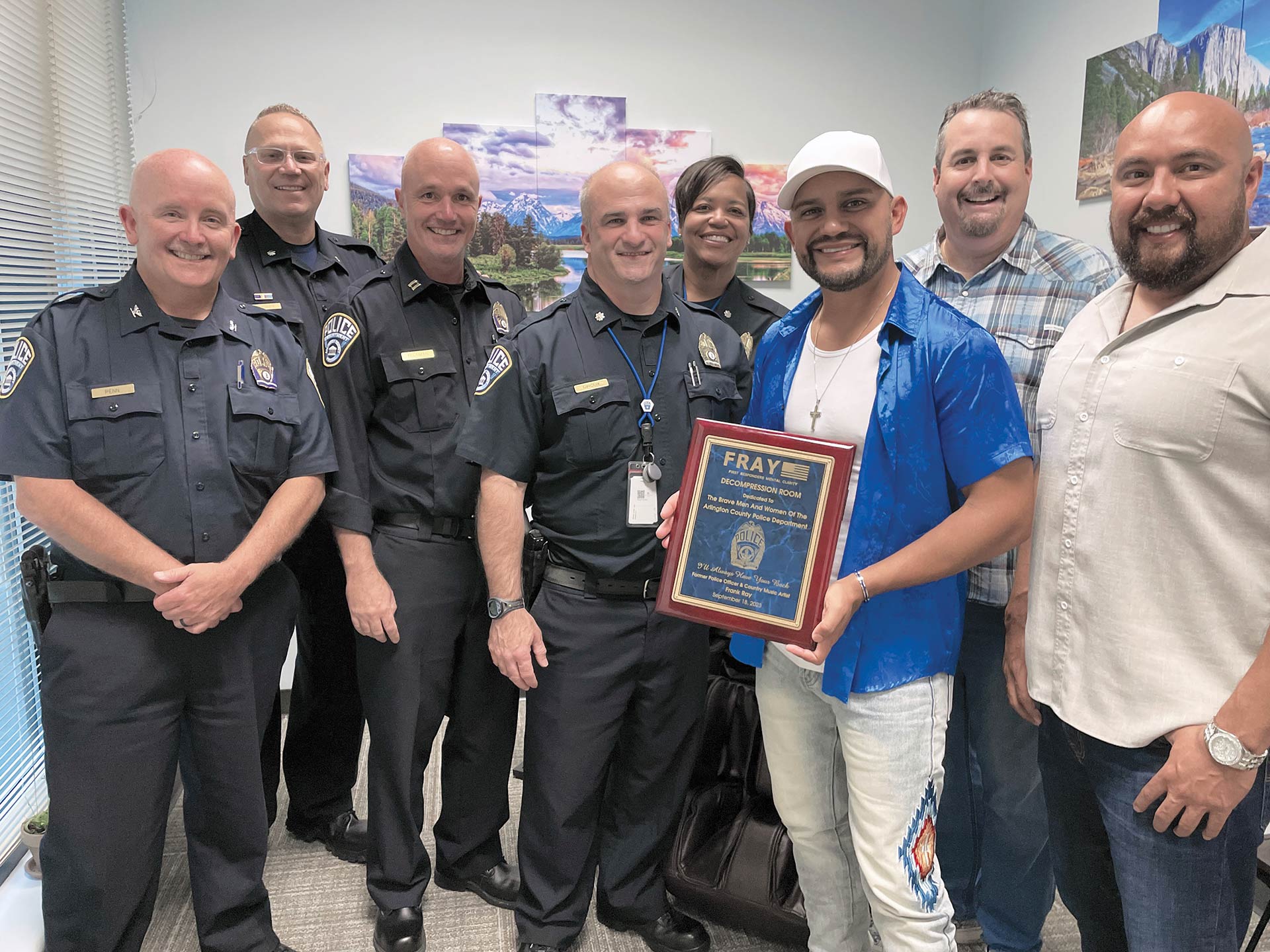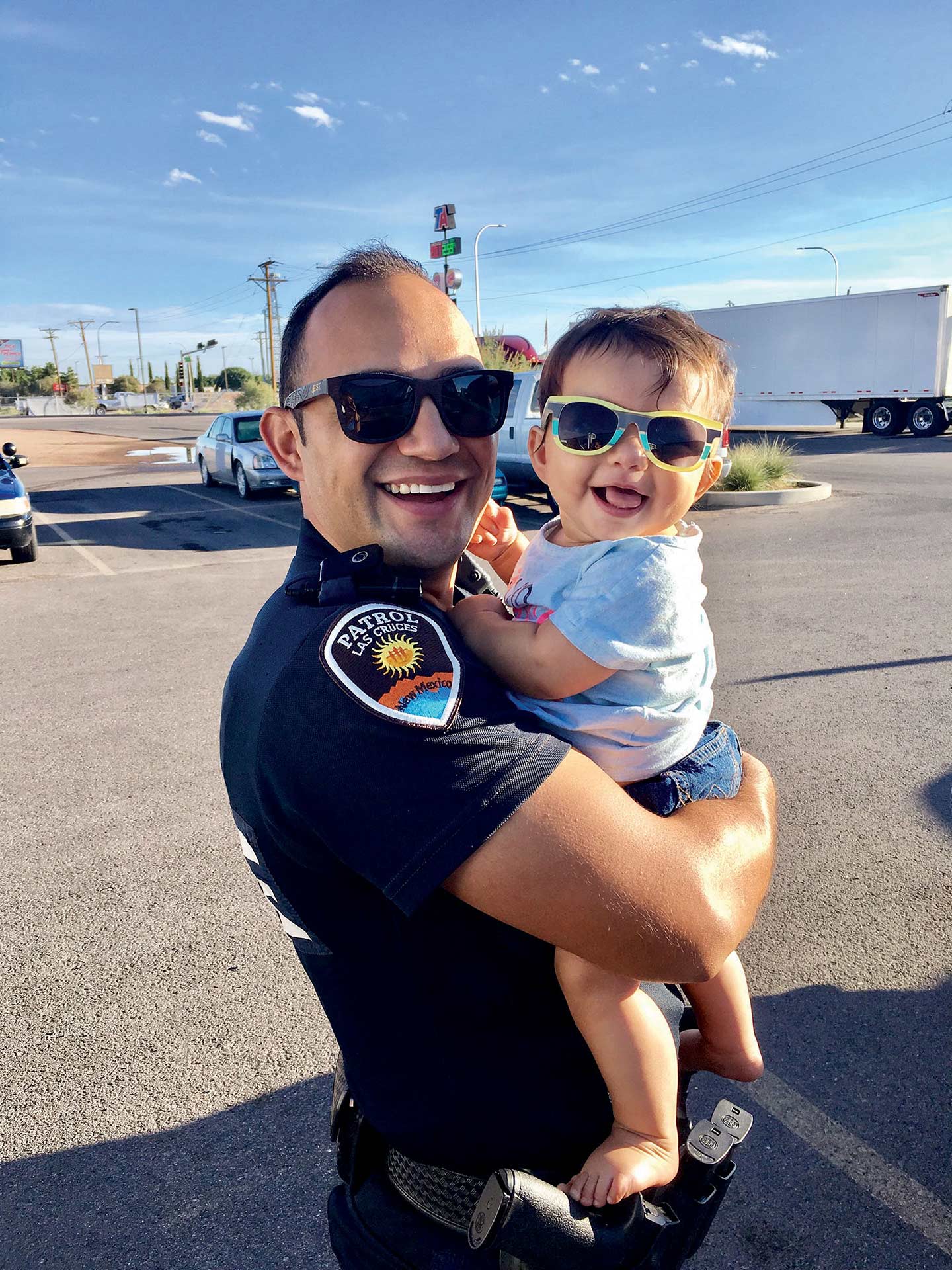
The National Law Enforcement Officers Memorial Fund (NLEOMF) announced in November that renowned country music recording artist Frank Ray will serve as honorary chief ambassador for its Ambassador Program, taking the lead on raising awareness and generating support for the Fund and its mission to honor the fallen, tell the story of American law enforcement and make it safer for those who serve.
Ray was an officer with the Las Cruces Police Department in New Mexico for 10 years before embarking on his music career full-time. In the three years since, he’s racked up hits, signed a record deal and garnered national media buzz. His self-titled label-debut album is available across streaming platforms. Recently on tour with Old Dominion and now performing at major music festivals across the U.S., he visits public safety departments at each tour stop to promote well-being through his First Responders Mental Clarity (FRAY) initiative. He recently spoke with APB about his police career, the importance of mental health and his new role with NLEOMF.
What drew you to law enforcement?
I was working at the Luna County Detention Center in Deming, New Mexico. I did that for about 11 months and formed a lot of relationships there with the police officers that were bringing in new inmates, and they were the ones that said, “Hey, it’s a lot more fun on this side. Why don’t you come over?” I just happened to be in Las Cruces on one of my days off and I saw they were recruiting, and I submitted an application and the rest is history. When I became part of the department, I became part of a family. It was so much bigger than I ever could have anticipated. And it just became this huge part of my life. It’s really shaped the person that I am today. It just kind of came to me, and it wound up being a calling.
What were some of your favorite parts of the job?
Driving fast [laughs]. No, my favorite part is when you actually do have a positive impact in the community and you’re able to really make a difference. I would often walk around the police department saying that to different people, just throwing up a little hashtag with my fingers and saying, “#Makeadifference.” And of course all my colleagues thought I was as annoying as all get-out, but the truth is, it really did something. It changed my heart and it was really cool to be a part of something bigger than me.
Is there anything you still miss about it?
Yes, I miss handling everybody else’s problems [laughs]. No, I miss the camaraderie for sure. I think it was awesome. I certainly miss the people that I worked with. And it’s because of that that I always wanted to stay close to the world of first responders and law enforcement, which is why I’m still very active in that community, because they’re near and dear to my heart. Like I said, it’s a family, and I wanted to make sure I was representing them in the best way possible, even though I’m not wearing a uniform anymore.
How did you transition to a music career?
Music was always my life’s passion. It was always going to be the thing that I was going to do. I just never really had a path, a vision of how I was going to accomplish that. After I dedicated my life to law enforcement, they found out that I could sing, and so they would often ask me to sing at the academies or ceremonies or Police Week. Whenever I decided to form a band, I would go work day shift and then at night I would play at regional country dive bars. I gained enough of a following that I could really start to take it seriously. So it was no surprise to the police department when I said, “I think I’m going to go chase country music now.” They were like, “Yeah, that makes sense.”
And it clearly worked out for you!
Yeah, it really did! It was so nerve-wracking and crazy, when you think it about it, but it actually worked out. I did it with this weird, almost naïve optimism, you know? That it was just going to work out. And who knows? Maybe that’s why it worked out, because I had that mentality. In hindsight, I’m like, “That is absolutely insane. It’s so crazy that I did that.”

What inspired your FRAY initiative?
I attended a conference for Hispanic leaders in D.C., and there was a segment dedicated to mental health, and not surprisingly, it was one of the least attended segments of the convention. And that tells you right there that there’s already a negative stigma attached to mental health, and there’s not really a big conversation even though it’s probably the biggest problem that we face today as a society. They were talking to different doctors and law enforcement came up, and how they could do a better job of dealing with people who suffer from mental illness. And I was like, “Hey, these people wear a lot of hats already,” you know? They are therapists, they are authority figures, they are counselors, they are lawyers, they have to do all these different things and it’s very, very stressful and they don’t get a lot of credit for it. And to put on top of that being a physician for mental health… Is anyone thinking about what they deal with, and how theirmental health is being affected? A light bulb went off: I’m going to use my platform to raise awareness on this matter, and to also change the conversation with first responders. Because we are unfortunately notorious for compartmentalizing our issues. We need to chip away at that stigma that’s attached to mental health, normalize it and then raise awareness so we can also change the public perception on how they view law enforcement and first responders. So I started the FRAY initiative, and I’m using my country music platform to get the message out there.
Do you feel you’ve been able to make an impact?
Absolutely. It caught fire faster than I was prepared for. I think it’s received a little differently because I’ve walked a mile in those shoes, and so these men and women tend to lend their ear a little more willingly. And these FRAY decompression rooms that we’ve been focusing on essentially provide full-body massage chairs, ambient sound and lighting to make it kind of spa-like and sort of like a mini-retreat. We’ve been donating these rooms to these different police stations, where if you’re working and you have five or 10 minutes to yourself, you can pop into the room, sit on the chair and get a massage or something real quick and get your mind right, get your body right and then go back out there and take care of business. That’s had a positive impact, not just because it shows the support from someone in the community, but also because just a little five-minute massage can really go a long way with overall wellness.
What will your new role as NLEOMF chief ambassador entail?
It’s honestly the honor of my life. It’s just an awesome organization to be associated with. I think I’m in a very unique position to help them out as well, because I can garner some national attention as a country music artist. There are several organizations that are designed to help law enforcement and first responders, but they kind of slip through the cracks, because if you’re not a part of that community, you don’t know that they exist. But you don’t have to be a part of that community just to be a fan of country music. So as they listen to my music and then they find out that I have something more to say that has some real substance outside of whiskey and heartbreak, it helps really change the public’s perception.
As you travel around visiting departments and talking to officers, what kind of things are you hearing from them about the challenges the profession is facing and what kind of support they need?
I think law enforcement has been painted with this really broad stroke of “Hey, you’re all bad people and all you want to do is shoot people and take lives,” and that could not be further from the truth. But unfortunately, because that’s happened and been amplified through media outlets, there isn’t a whole lot of incentive to sign up to wear the uniform or bear the badge. It used to be this profession that was respected and admired, and now you see the numbers dwindling in people that are actively seeking to be a police officer or a firefighter. So that’s one of the biggest challenges I think that they have, just the lack of support from the community because of the misinformed perception, which then makes it harder for them to hire, which makes it harder for them to take care of the community because they’re having to get creative and find different ways to answer calls for service because they just don’t have the manpower. I could go on and on, but that’s probably the biggest commonality, just the lack of support, and unfortunately it’s because of the misinformed opinions.
You’ve said your music was an outlet for dealing with the stresses of the job when you were a cop. Does it feel good to know that now it might be providing the same thing for other people?
Yeah, absolutely — to think that it actually has a positive impact on somebody’s life is incredible, and that just motivates me to want to make more music and to continue to do what we’re doing. I strongly encourage everybody to find a thing that makes you happy and go do that, if it’s music or working out or hiking or hunting or fishing. Whatever it is, find that thing that’s outside of law enforcement, because you need to be able to decompress and get away from the daily stresses and trauma of the gig. Find a hobby, and when you’re off, be off.
Is there anything else you want to tell our readers?
Thank you for your service, for all the brave men and women who are still doing the job. I know how thankless it can be, but just know that there are people out there in the community that support you, there are people in my position that support you, and your service is not lost on me or anybody on my team. Stay safe, take care of each other and help me change the conversation on how we view mental health, because we’re a family, and we need to watch out for each other.
As seen in the January 2024 issue of American Police Beat magazine.
Don’t miss out on another issue today! Click below:






